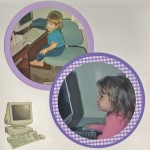Almost two decades ago, Daniel and I scrutinized the ten or twelve boxes of cutting-edge “educational software” at CompUSA, finally settling on Reader Rabbit. Back home, we devoted the evening to learning the program, ourselves, so that we could help our daughter with it, during the upcoming weeks and months. We stayed up past midnight, and I’m pretty sure we high-fived each other for being such with-it, tech-savvy, forward-thinking parents.
Forty-five minutes. What had taken two college-educated adults hours to figure out together took our 3-year-old less than one hour, all on her own.
I feel like I should have seen this multi-media, social-networking, technology-addicted, Web 2.0 version of reality coming, a long long time ago. But it took Time’s March 2006 article “The Multitasking Generation” to wake me up to the truth: (a) things are changing fast and (b) things will never be the same.
And as I raise, work with, and study “Gen M”, I’m realizing (a) “those wacky kids” are changing fast and (b) “those wacky kids” will never be the same. Technology evangelist, Mark Pesce, celebrates that we’ve provided our kids with the “very best tools possible to communicate.” Almost as an aside, he admits: what we don’t know are the unintended consequences.
I certainly failed to see the “unintended consequences” coming. As a society, we have placed a vast array of life-altering communication tools into the hands of the youngest, the most vulnerable. And now we are sitting back and watching what’s happening. Our kids are guinea pigs in a giant experiment for which no official consent form has been signed.
Case in point: Call me naive, but when we put a new computer in our daughter’s room when she was 13, it never occurred to me that the computer came pre-programmed with DVD software. While I thought we were maintaining a “plug-in drug”-free home, Annemarie was spending hours watching movies in her room. I had sworn to never allow a TV or DVD player in her room. And yet, I unwittingly gave her both.
In a 2001 interview, novelist Ray Bradbury said, “When I wrote Fahrenheit 451 [published in 1953] I was worried about people being turned into morons by TV and popular culture. Now, I’m afraid of people “playing” their life away with too many “toys”, wasting their time. We can use [the Internet] as a good tool. I hope it’s an experiment that works.” (emphasis mine)
As studies on the current generation continue to accumulate–Kaiser’s Generation M (2005) and the new Generation M2 (2010), Pew’s Social Networking (2007)–I keep wondering how we let this “experiment” just happen. Did anyone see it coming? Or did an “anything that can be done” get done to us “while we were sleeping”?
We wouldn’t have taken this approach with an experimental mind-and-behavior-altering drug. We wouldn’t have said, “Hey, let’s hand it over to the kids. We’ll let them self-regulate the dosage. And then we’ll study the impact with little-to-no intervention!”
It’s easy to get excited about kids and technology being such a “native” combination. But are we, per chance, dressing up for a party when we should be responding to a revolution? As much as I want to celebrate my students’ vast potential for connection and collaboration, inspiration and empowerment, I also wonder: Am I neglecting the fact that people get hurt in revolutions? that kids, especially, get hurt in revolutions?
I’m talking about the hurt of isolation I see in my often frantically hyper-connected students. Recently, as we were reading Fahrenheit 451 and the students realized that people in Bradbury’s futuristic society spend their days with tiny earphones piping noise into their ears and minds, one of my sophomores spontaneously yelled, “This is us!” As we read about their pervasive societal loneliness, another student identified, describing how she goes on Facebook at 3:00 AM and types, “Is anyone out there? Anyone at all?”
I’m talking about the hurt of ineptitude my kids feel in the face of heightened expectations. I can’t be the only teacher discovering that the same student who can figure out my new BlackBerry–sans manual!–may melt in frustration when I expect him to transfer those “same” learn-while-doing skills to, say, creating his Works Cited using NoodleTools.com. (After all, it’s on the computer; aren’t all kids “digital natives” these days?)
And I’m talking about the hurt of children who feel disconnected from adults who matter to them, especially adults who buy into Pesce’s idea that kids today are “on a different planet.” When my sophomores do “Generation M” research projects each year, their #1 conclusion is not that they need newer gadgets, updated classrooms, or even unlimited Facebook access.
The #1 “thing” kids want, year in and year out, is more unrushed, agenda-free, face-to-face times with the key adults in their lives.
You know, those wacky adults who are out shopping for the newest software. Those wacky adults putting computers in kids’ bedrooms without taking the time to see what’s on them. Those wacky adults building blogs and finding friends on Facebook.
Who could have seen that coming?
- Ch…ch…ch…CHANGES Are Coming in 2017 for TMI - December 27, 2016
- What New Thing Are You Ready to See God Do in Your Life in 2017? - December 26, 2016
- Heaviness and Newness - December 23, 2016



